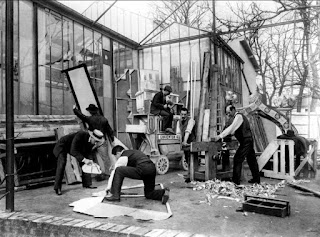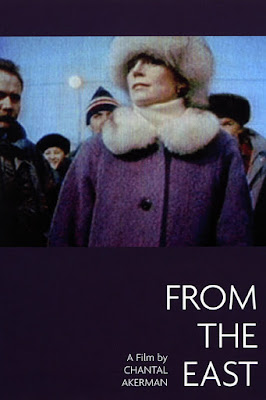Cine y descubrimiento.

Creative Geography, Lev Kuleshov

Cine y cartografía (Niney)
Cine e imaginación
“THE CRUEL RADIANCE OF WHAT IS” James Agee

Nanook of the North (1922)
“I don’t think either of us knows what the rules and regulations of ethnographic filmmaking are. Our work fits awkwardly within anthropology, awkwardly within art, and awkwardly within cinema” Verena Pavarel

(Leviathan, 2012)
“It seems to be a mystification, this whole idea of a particular breed of ‘ethnographic filmmaker’ set apart from other image makers” Verena Pavarel


Michael Taussig. Mimesis and Alterity: A Particular History of the Senses.
John Berger. Modos de ver.
Jean Rouch
Le Maitres fous (1955)
https://www.youtube.com/watch?v=r672kQp-o-0
Jaguar (1967)
https://www.youtube.com/watch?v=QHMBj393nN0
Robert Gardner
Dead Birds (1963)
https://www.youtube.com/watch?v=bCkN6Z_VMxE

Forest of Bliss (1986)
https://www.youtube.com/watch?v=eY2xBY0Lw4k
https://www.youtube.com/watch?v=xC7JZKprUTM
“But I always struggled with the norms and forms of written anthropology. I felt I couldn’t express most of what I wanted to share in that way” Verena Pavarel
Chick Strand.
Fake Fruit Factory (1986)
https://vimeo.com/10012466
“All documentary, just by its nature, is going to be inadequate” Ben Rivers
“Once you recognize that it’s impossible, then you’re freed of this burden of trying to say or show everything about someone” Lucien Castaing-Taylor
In and Out of Africa (1993)
https://www.youtube.com/watch?v=C_AEVFrurj8
“And then there are all these ways in which the moment somebody becomes aware of the camera, then they start performing for it. But rather than being false, this can actually reveal aspects of the person that would never appear if they were indifferent to the camera (…) The difference between the social actor and the filmic actor is really intricate. It can be subtle or complex, a difference of degree or kind. There are an infinity of performativities in life, and in all our films (…) These selves blend and merge into each other. It’s not as if one is true and one is false” Lucien Castaing-Taylor
Un lac (2008). Phillipe Grandieux
https://www.youtube.com/watch?v=Fj6JC24FqPA

“For me, there’s a dance between both fact and fiction, and between the filmmaker and the filmed. At the same time, and this is something totally different, we’re increasingly interested in the non-human, which has an agency of its own, even if we tend to overlook or deny it. We’re interested in the mutual constitution of the human and the non-human, whether animal, technological, or natural. Humans have increasingly receded from getting pride of place in our films. We try to relativize and resituate them in a much wider ecological sphere” Verena Pavarel
Leviathan (2012)
https://www.youtube.com/watch?v=lEwV0kkAzLU
“It’s about that interplay of these layers of looking” Ben Rivers
Slow Action (2011)
https://www.youtube.com/watch?v=FVruPaRsWRs
Hobart, Mark (2000) After culture: anthropology as radical metaphysical critique.
Laura Marks, “Skin of the film”
“tactilismo, odorismo” Laszlo Moholy-Nagy
“Films are things that we consume and then that person becomes the consumed” Ben Rivers
“I do feel that even though I become really attached — even too attached — to people that I work with, if you’re moving from one subject to another, one group of subjects to another, there is an act of violence there, too” Lucien Castaing-Taylor

El suplicio de Cuauhtémoc, Leandro Izaguirre.
“I don’t think anyone’s necessarily exploiting anyone. You guys are so politically correct. If you find what I can only call the juste distance between filmmaker and filmed, even if each wants to get something — and probably something different — out of ir, that’s not necessarily exploitative. It can even be a kind of love, or a king of beneficence, on both sides” Verena Pavarel
“I guess it’s more that the film and the life lived making it are intricately linked, and that the film is about this moment between me the filmmaker and the person or people in the film” Ben Rivers

“I also think it’s a problem when films that deal with outsiders or Third or Fourth World subjects are automatically called ethnographic” Verena Pavarel
“Sublimated racism…” Lucien Castaing-Taylor

(1953)
“We also have a profound attachment to the real, as something, a kind of surplus or excess that exceeds the maker’s intentions, that is different from most artists and even most documentarians. It’s an aesthetic as well as an ethical attachment” Verena Pavarel

Trinh Minh-ha. Ressemblage (1083).
Chantal Akerman

D’Est
https://www.youtube.com/2WMX_z81RMI
https://www.youtube.com/7QYByp84_6I